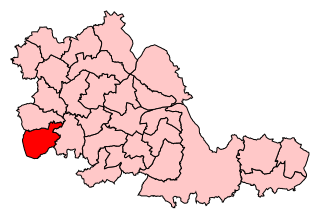Related Research Articles

The Nigerian Civil War was a civil war in Nigeria fought between the government of Nigeria headed by General Yakubu Gowon and the secessionist state of Biafra led by Lt. Colonel Odumegwu Ojukwu from 6 July 1967 to 15 January 1970. Biafra represented nationalist aspirations of the Igbo people, whose leadership felt they could no longer coexist with the Northern-dominated federal government. The conflict resulted from political, economic, ethnic, cultural and religious tensions which preceded Britain's formal decolonization of Nigeria from 1960 to 1963. Immediate causes of the war in 1966 included ethno-religious violence and anti-Igbo pogroms in Northern Nigeria, a military coup, a counter-coup and persecution of Igbo living in Northern Nigeria. Control over the lucrative oil production in the Niger Delta also played a vital strategic role.

Gwynfor Richard Evans was a Welsh politician, lawyer and author. He was President of the Welsh political party Plaid Cymru for thirty-six years and was the first Member of Parliament to represent it at Westminster, which he did twice, from 1966 to 1970, and again from 1974 to 1979.

Stourbridge is a constituency represented in the House of Commons of the UK Parliament since 2019 by Suzanne Webb, a Conservative Party politician. The seat was previously held by Margot James, a Conservative who lost the whip during September and October 2019.

The Independent National Electoral Commission (INEC), set up in 1998, is the electoral body which oversees elections in Nigeria.

Nelson is a New Zealand parliamentary electorate, returning one Member of Parliament to the House of Representatives of New Zealand. From 1853 to 1860, the electorate was called Town of Nelson. From 1860 to 1881, it was City of Nelson. The electorate is the only one that has continuously existed since the 1st Parliament in 1853.
Kwadwo Afari-Gyan is a Ghanaian academic, political scientist and election administrator. He was Chairman of the Electoral Commission of Ghana from 1993 to 2015.
Mohammed A Muhammed is a Nigerian politician, now a member of the Senate for Bauchi State. Married to Justice Zainab Adamu Bulkachuwa, President of the court of Appeal, Abuja.
John Nanzip Shagaya (Danburam Langtang II) was a Nigerian senator and former senior military officer who was elected in April 2007 to represent the People's Democratic Party (PDP) in Plateau State as member of the Nigerian Senate for Plateau South. He ran for reelection in April 2011 on the Labour Party (LP) platform, but was defeated by Victor Lar of the PDP. As a non commissioned officer (NCO) with the 2nd Reconnaissance Squadron in Abeokuta, he participated in the Nigerian Counter-Coup of 1966.
Joseph Wayas served as Nigeria's third Senate President during the Nigerian Second Republic (1979–1983).

Professor Attahiru Muhammadu Jega is a Nigerian academic and former Vice-Chancellor of Bayero University, Kano. On 8 June 2010, he was nominated by then President Goodluck Jonathan as the new Chairman of the Independent National Electoral Commission (INEC), subject to Senate confirmation, as a replacement for Professor Maurice Iwu, who vacated the post on 28 April 2010. Jega is the only INEC chairman to oversee two Nigerian General Elections. Jega retired on 30 June 2015, handing over his position to Amina Zakari according to a directive by President Muhammadu Buhari.
Michael Ani was chairman of the Federal Electoral Commission (FEDECO) established by General Olusegun Obasanjo to conduct elections leading to the Nigerian Second Republic, which was inaugurated on 1 October 1979. He held office from 1976 to 1979.
Justice Victor Ovie Whisky was chairman of the Federal Electoral Commission (FEDECO) appointed by President Shehu Shagari during the Nigerian Second Republic. He held office from 1980 to 1983.
Professor Eme Awa was chairman of the National Electoral Commission of Nigeria (NECON), appointed by President Ibrahim Babangida. He held office from 1987 to 1989, when he resigned due to a disagreement with Babangida.
Professor Humphrey Nwosu was chairman of the National Electoral Commission (NEC) appointed by President Ibrahim Babangida, holding office from 1989 to 1993.
Chief Sumner Karibi Dagogo-Jack was chairman of the National Electoral Commission of Nigeria (NECON) appointed by President Sani Abacha, holding office from 1994 to 1998.
Professor Okon Edet Uya was briefly chairman of the National Electoral Commission of Nigeria (NECON), appointed by President Ibrahim Babangida after the presidential elections of 12 June 1993 had been annulled and his predecessor Humphrey Nwosu dismissed.
Umaru Dahiru Tambuwal was elected Senator for the Sokoto South constituency of Sokoto State, Nigeria, on the All Nigeria People's Party (ANPP) platform, taking office on 29 May 2003. He was reelected in 2007 as a member of the People's Democratic Party (PDP).
Abubakar Umar Tutare is a Nigerian politician who was elected Senator for the Taraba Central Senatorial District of Taraba State, Nigeria in the April 2011 general elections, running on the People's Democratic Party (PDP) platform.

General elections were held in Nigeria on 28 and 29 March 2015, the fifth quadrennial election to be held since the end of military rule in 1999. Voters elected the President and members to the House of Representatives and the Senate. The incumbent president, Goodluck Jonathan sought his second and final term.
Abdullahi Aliyu Sumaila was a Nigerian administrator, politician, entrepreneur, lecturer, farmer and teacher.
References
- ↑ Imam Imam (9 June 2010). "Past INEC Chairmen". ThisDay. Retrieved 2010-06-10.
- ↑ Thomas Lionel Hodgkin; Elizabeth Hodgkin; Michael Wolfers (2000). Thomas Hodgkin: letters from Africa 1947-56. HAAN. p. 32. ISBN 1-874209-93-6.
- ↑ Remi Anifowose (1982). Violence and politics in Nigeria: the Tiv and Yoruba experience . Nok Publishers International. ISBN 0-88357-084-X.
- ↑ Olukorede Yishau (2010-06-09). "Will he make the difference?". The Nation. Archived from the original on 2010-06-11. Retrieved 2010-06-10.
- ↑ Herbert Ekwe-Ekwe (1990). The Biafra war: Nigeria and the aftermath. E. Mellen Press. p. 39. ISBN 0-88946-175-9.
- ↑ "ELECTORAL COMMISSION THROUGH THE YEARS". NBF News. 7 Jun 2010. Retrieved 2010-06-10.